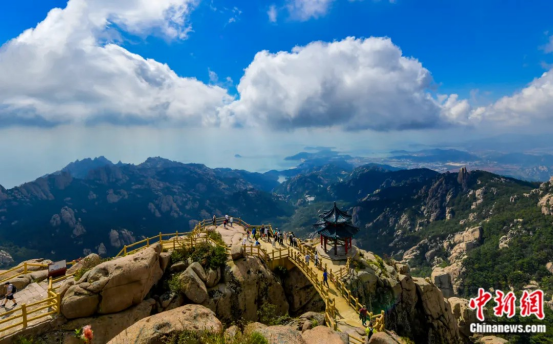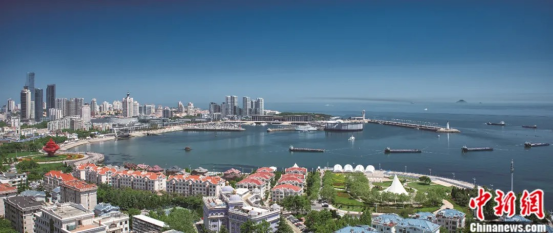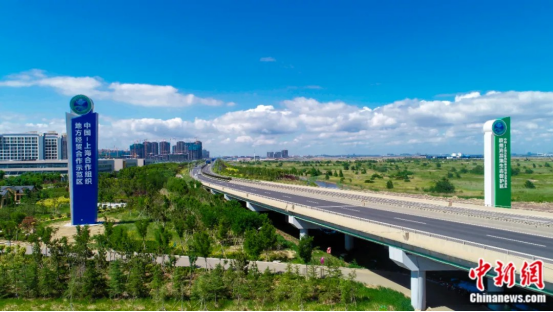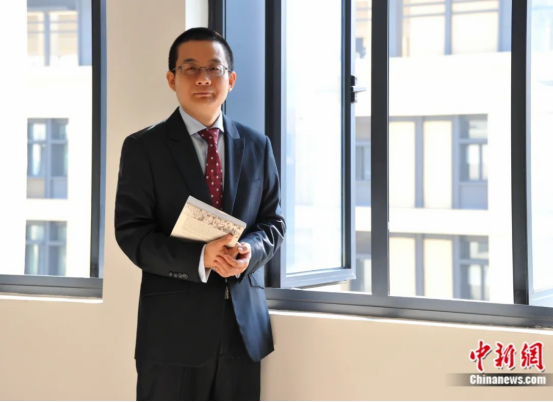China News Agency Qingdao, July 27, Title: Why Qingdao Became China's First "SCO Tourism and Cultural Capital"?
——Interview with Edmund Li Sheng, Distinguished Professor of Shandong University and Executive Director of the Institute of Shanghai Cooperation Organization Studies.

Since its establishment, the Shanghai Cooperation Organization (SCO) has prioritized tourism and cultural exchanges as key areas of cooperation within its framework. The creation of the "SCO Tourism and Cultural Capital" initiative represents one of the organization's most significant cultural projects in recent years. On July 4, during the SCO Summit in Astana, Qingdao, China was officially designated as the "2024-2025 SCO Tourism and Cultural Capital."
What makes tourism and cultural exchanges so vital to the SCO? And why was Qingdao, this coastal metropolis, selected as China's first recipient of this prestigious title? Edmund Li Sheng, Distinguished Professor at Shandong University and Executive Dean of the Institute of SCO Studies, recently addressed these questions in an exclusive interview with China News Service's "East-West Dialogue."
The interview transcript is summarized as follows:
China News Service reporter: Since the establishment of the Shanghai Cooperation Organization (SCO), tourism and culture have become important areas of cooperation within its framework. Why does the SCO place such great emphasis on exchanges and cooperation in tourism and culture? What inspiration will the SCO's exchanges in tourism and culture bring to the development of the global cultural tourism industry?
Edmund Li Sheng:Cultural exchanges and mutual learning serve as bridges to enhance friendship among peoples, driving forces for the progress of human society, and bonds for maintaining world peace. Cooperation in tourism and culture facilitates deeper understanding between nations in terms of culture, values, and emotions, laying a solid foundation of mutual trust for collaboration in economic, political, and security fields.
The SCO region covers over one-quarter of the Earth's land area, with its member states accounting for 40% of the world's population. It boasts abundant natural and historical cultural heritage, presenting enormous potential for tourism development. As tourism serves as a vital economic pillar for many SCO countries, strengthening exchanges and cooperation in tourism and culture will help promote economic growth across relevant nations, achieving mutual benefit, win-win outcomes, and common prosperity.
The SCO's exchanges and cooperation in tourism and culture exert profound influence on the development of the global cultural tourism industry. Through their collaborative efforts in tourism and culture, member states not only mutually reinforce each other, setting an example for other regions to enhance mutual understanding and trust through cultural and tourism exchanges, but also provide inspiration for innovative development in the world's tourism industry. Such cooperation further expands the tourism markets of SCO countries, injecting new vitality into their tourism sectors. As one of the SCO's key member states, China will continue to play its due role in advancing cultural and tourism cooperation within the organization, leading and driving SCO nations to explore new directions for collaboration.
China News Service Reporter: From Varanasi in India to Almaty in Kazakhstan and now Qingdao in China, what unique role does the designation of "SCO Tourism and CulturalCapital" play in promoting exchanges among SCO member states?
Edmund Li Sheng:Cities serve as vital ambassadors showcasing a nation's international image and represent the primary window for SCO member states to understand each other's cultural essence. By hosting a series of high-level cultural exchange activities, cities can demonstrate their unique cultural characteristics and charm on international platforms, attracting global tourists and investments, thereby significantly enhancing close ties and cooperation in tourism and cultural fields among nations.

Laoshan Mountain, the highest coastal mountain in China, bears the name as“No 1 coastal mountain.”The photo shows an aerial view of the Laoshan Mountain Scenic Area. (Photo provided by the Laoshan District Committee Publicity Department)
The establishment of the "SCO Tourism and CulturalCapital" facilitates mutual learning among civilizations at both state-to-state and people-to-people levels.At the diplomatic level, this initiative elevates the promotion of member states' cultural resources to new heights, unlocking the cooperative potential of SCO nations in tourism development.On the societal level, citizens of SCO countries can personally engage in cultural tourism activities across different designated cities, fostering personal connections that bridge cultural divides while strengthening grassroots mutual trust and reciprocal benefits.
China News Service Reporter: Why was Qingdao selected as China's first "SCO Tourism and CulturalCapital"? What unique advantages and concrete measures does Qingdao possess in facilitating mutual learning among civilizations across SCO member states?
Edmund Li Sheng:Qingdao's distinction as China's first "SCO Tourism and Cultural Capital" stems primarily from its strategic geographical advantages. As the northern terminus of the ancient Maritime Silk Road, Qingdao has served since antiquity as a vital gateway for maritime trade and cultural exchange. The city functions as China's crucial Pacific port and holds dual strategic positioning as both a key node along the New Eurasian Land Bridge Economic Corridor and a primary hub of the 21st Century Maritime Silk Road. Furthermore, Qingdao boasts a comprehensive, multi-dimensional transportation network. These unique geographical and infrastructural advantages provide unparalleled benefits for promoting cultural and tourism exchanges with SCO member states.

Coastal scenery of Qingdao City, Shandong Province. (Photo by Mi Xiaomi)
Secondly, Qingdao possesses distinctive resource advantages. As one of China's first batch of outstanding tourist cities, Qingdao is endowed with abundant tourism and cultural resources, heritage sites and historical relics, earning it the prestigious title of "Culture City of East Asia." In recent years, Qingdao has actively cultivated internationally influential cultural tourism brands, laying a solid foundation for its designation as the "SCO Tourism and Cultural Capital." The successful hosting of the 2018 SCO Qingdao Summit marked a significant milestone, as the city was entrusted with the developmental mission of establishing the China-SCO Local Economic and Trade Cooperation Demonstration Zone (referred to as the "SCO Demonstration Zone"). This has accorded Qingdao a unique position within the SCO cooperation framework and provided an important platform for cultural and tourism exchanges between Qingdao and SCO member states.

The China-SCO Local Economic and Trade Cooperation Demonstration Zone located in Jiaozhou City, Qingdao, Shandong Province. (Photo provided by the Administrative Committee of the SCO Demonstration Zone)
Currently, Qingdao has established extensive cooperative relationships with SCO member states across economic, trade, cultural and tourism domains. The city has formed partnerships with 20 international port cities and co-initiated the China-SCO Industrial Park Alliance with 40 industrial zones. Qingdao's international "friendship city" network within SCO countries has expanded to 15 cities across 12 countries and regions.
As is widely recognized, Qingdao has successfully hosted a series of high-profile international conferences and events, including the SCO Qingdao Summit, the Belt and Road Energy Ministers' Meeting, and the "SCO Summer" series, establishing itself as a diversified platform for cultural exchange. Furthermore, Qingdao has developed tourism cooperation mechanisms with several SCO tourist cities, continuously improving communication channels and industry dialogue platforms. These institutional arrangements provide solid foundations for promoting tourism market development and cooperation among SCO nations.
China News Service Reporter: How should Qingdao seize this historic opportunity as the "SCO Tourism and Cultural Capital" to make greater contributions in promoting cultural exchanges and enhancing people-to-people connectivity among SCO member states?
Edmund Li Sheng:Qingdao should more effectively shoulder its national responsibility in developing the SCO Demonstration Zone. The city must integrate SCO mechanisms and the SCO spirit into its institutional development framework, serving as a model to extend its influence to Belt and Road partner countries and support China's broader opening-up strategy.
The dual identities of the SCO Demonstration Zone and "SCO Tourism and Cultural Capital" complement and reinforce each other. Building the cultural capital will in turn benefit the demonstration zone by elevating Qingdao's international profile and influence. The cultivation and development of cultural tourism industries will drive industrial upgrades within the demonstration zone and attract more international investors to participate in its construction and growth. China can fully leverage Qingdao's unique advantages in tourism and culture, positioning the city as a pivotal hub for tourism cooperation and cultural exchanges among SCO members. This will inject new perspectives into the organization's cultural and tourism collaboration.

The Qingdao International Beer Festival, recognized as one of the world's top four beer festivals, has attracted numerous domestic and international tourists to experience its offerings. (Photo provided by the Publicity Department of Qingdao West Coast New Area Administrative Committee)
China News Service Reporter: As the SCO's "international reception room," the SCO Demonstration Zone has hosted the "SCO Summer" series for three consecutive years. How can it contribute to building the "2024-2025 SCO Tourism and Cultural Capital" and boost cultural-tourism exchanges among SCO nations?
Edmund Li Sheng:As an international cultural exchange event, "SCO Summer" can enhance cultural interactions among SCO countries through greater diversification and innovation. In the digital realm, the event could establish digital platforms and pioneer innovative services to deepen cultural cooperation and forge closer people-to-people bonds within the SCO community.
Regarding education and academic exchanges - where cultural understanding among youth profoundly impacts interstate cooperation - "SCO Summer" should serve as a platform for scholarly interaction, collaborative programs, and intensified language and cultural exchanges. (End)
Interviewee Profile:

Edmund Li Sheng, Distinguished Professor at Shandong University and Executive Dean of the Institute of Shanghai Cooperation Organization Studies. With longstanding expertise in international political economy and tourism city governance, he has published more than one hundred research papers in prestigious international academic journals across these fields. His scholarly contributions have earned him the Second Prize of the Outstanding Research Award in Humanities and Social Sciences from China's Ministry of Education, as well as the China New Development Award established by Springer Nature, the globally renowned academic publishing group.
